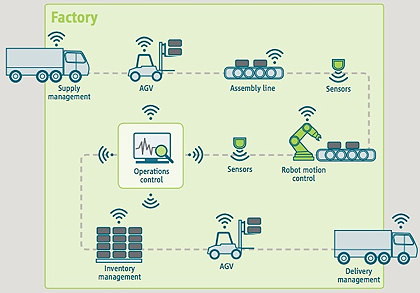5G-ACIA will contribute to the standardisation and regulation of 5G, as well as identifying and analysing possible use cases and their requirements. The group’s chairman, Dr Andreas Müller of Bosch, predicts that 5G will become the central nervous system of the factory of the future, and will have a disruptive impact on industrial production.
“In the 5G-ACIA,” he adds, “we are bringing together, for the first time, all important players worldwide. This enables us to work concertedly and purposefully to take the interests of industry into account.”
5G promises high-speed wireless networking – at speeds of up to 20Gb/s –that will be suitable for critical industrial applications. It will support up to one million connected devices per 1km2, and operate with a latency of 1–10ms.

Some of the areas where 5G technology could play a vital role in the factory of the futureSource: ZVEI
Using 5G, it will be possible to implement Industry 4.0 faster, and take it to the next level of development. ZVEI says that the technology will allow a previously impossible degree of flexibility, versatility and mobility in industrial production.
5G-ACIA has published a White Paper, called 5G for Connected Industries and Automation, which provides an overview of the topic and presents the organisation’s goals.

